It is the dream of everyone to remain young as much as possible. However, since aging is a natural causative in itself, it proves harder to do so. This does not mean there is no way that it can be done since there are some ways that are still applicable. This is by consuming foods that are nutritious. Healthy foods are good anti-aging products. Here are some of the anti-aging foods that are known and have been used to retain the youth features.
Grapes
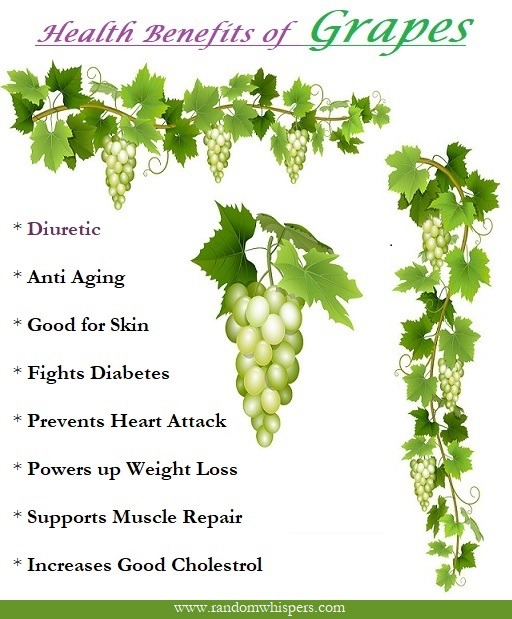
Grapes are one of the best anti-aging foods you can include in your diet, thanks to their rich content of antioxidants, particularly in the skins and seeds. One of the most powerful compounds found in grapes is resveratrol, a natural polyphenol concentrated in red and black grape skins. Resveratrol is known for its ability to protect cells from damage, reduce inflammation, and potentially activate proteins called sirtuins, which are linked to increased lifespan and cellular repair. These properties make grapes a potent ally in slowing down the aging process.
In addition to resveratrol, grapes contain a wide range of antioxidants such as flavonoids, quercetin, and anthocyanins, all of which help neutralize free radicals. Free radicals contribute to oxidative stress, a major factor in aging and age-related diseases. By reducing this oxidative damage, grapes help protect the skin, brain, heart, and other vital organs. They also contain vitamin C, which supports collagen production, keeping the skin firm and reducing the appearance of fine lines and wrinkles. The polyphenols in grapes may even provide a natural defense against UV damage, one of the main external causes of skin aging.
Eating grapes regularly may also contribute to better cardiovascular and cognitive health. The compounds in grapes help improve blood circulation, lower blood pressure, and reduce bad (LDL) cholesterol levels. These benefits collectively support heart health and may reduce the risk of heart disease over time. Additionally, the anti-inflammatory and antioxidant effects may help prevent cognitive decline and support brain function as you age.
To get the most anti-aging benefits from grapes, opt for darker varieties such as red, black, or Concord grapes, which contain more resveratrol than green grapes. Always eat the skin, where most of the antioxidants are found. If you’re comfortable with it, including the seeds provides additional anti-aging compounds called OPCs (oligomeric proanthocyanidins), which are especially powerful antioxidants. Grape seed extract is also available as a supplement for a more concentrated dose of these compounds.
Avocado
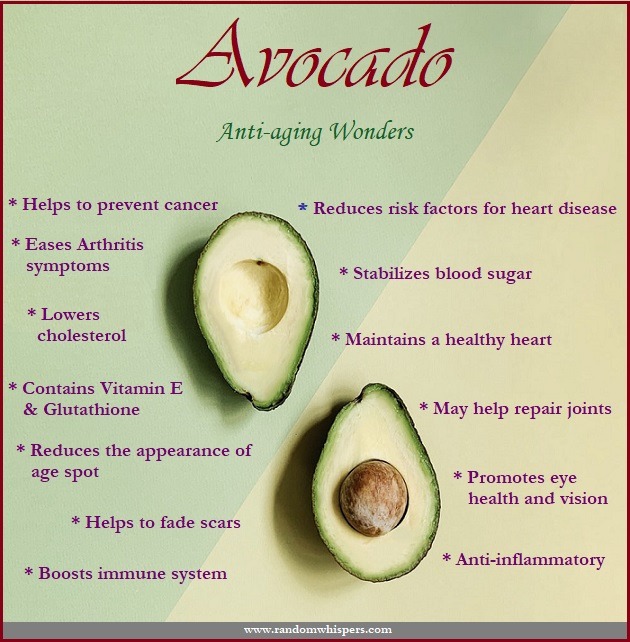
Another great anti-aging food is avocado due to its dense nutrient profile and skin-supportive properties. Rich in healthy monounsaturated fats, avocado helps keep the skin hydrated and supple. These fats also aid in the absorption of fat-soluble antioxidants such as vitamin E and carotenoids, which protect skin cells from oxidative damage and support a youthful appearance.
One of avocado’s key anti-aging benefits comes from its abundance of antioxidants. It contains vitamin E, which combats oxidative stress, and carotenoids like lutein and zeaxanthin that are known to support skin elasticity and eye health. Additionally, avocados contain glutathione, a powerful detoxifying compound that helps neutralize free radicals and slow down the aging process at the cellular level.
Avocados are also high in fiber, which supports digestive health and reduces systemic inflammation—a major contributor to premature aging and chronic diseases. By promoting a healthy gut microbiome, fiber indirectly enhances the skin’s appearance and overall vitality.
Moreover, avocados contain important nutrients like vitamin C and copper, both of which are essential for collagen production. Collagen is the protein responsible for maintaining skin structure and elasticity, and its natural decline with age can lead to wrinkles and sagging. Including avocados in your diet may help slow this process.
Incorporating avocado into your daily routine is simple. It can be enjoyed in salads, on whole-grain toast, in smoothies, or as guacamole. For an added boost, avocado can even be used topically in DIY face masks to nourish and moisturize the skin directly.
Garlic
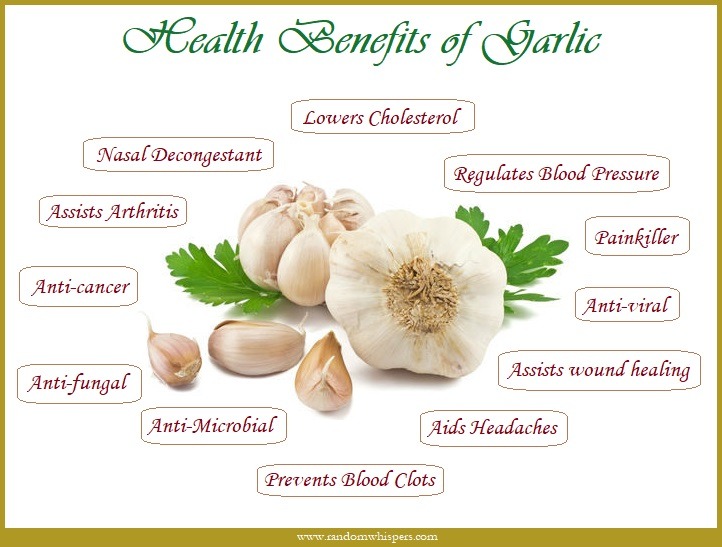
Garlic is widely regarded as one of the most effective anti-aging foods. One of its key strengths lies in its high antioxidant content, particularly a compound called allicin, which is formed when garlic is chopped or crushed. By reducing oxidative stress in the body, garlic helps to preserve cellular health and slow down visible signs of aging, including wrinkles and fine lines.
Garlic is also known for its strong anti-inflammatory properties. Chronic inflammation is a significant contributor to many age-related conditions, such as arthritis, heart disease, and even cognitive decline. Garlic’s sulfur-containing compounds help to combat inflammation at the cellular level, promoting overall health and longevity. Regular consumption may also support brain health by reducing the risk of neurodegenerative diseases like Alzheimer’s, making it a valuable food for maintaining cognitive function as we age.
Garlic also supports cardiovascular health—a key factor in healthy aging. It has been shown to lower blood pressure, reduce cholesterol levels, and improve blood circulation. Furthermore, garlic boosts the immune system, helping the body to ward off infections and illnesses that can become more serious in older adults.
For skin health, garlic offers antimicrobial and anti-inflammatory effects that can help maintain a clear, healthy complexion. These properties may assist in preventing acne and supporting the skin’s natural elasticity and regeneration, contributing to a youthful appearance. To maximize garlic’s benefits, it’s best to eat it raw or lightly cooked, as excessive heat can destroy some of its active compounds. Letting crushed garlic sit for about 10 minutes before cooking can also enhance its health effects.
Cruciferous vegetables
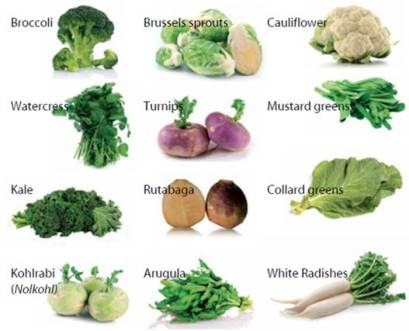
Cruciferous vegetables are among the best anti-aging foods you can include in your diet. These vegetables — including broccoli, kale, Brussels sprouts, cauliflower, cabbage, arugula, and watercress — are rich in nutrients, antioxidants, and compounds that support cellular repair and detoxification. One of the key anti-aging compounds found in many cruciferous vegetables is sulforaphane, which helps fight inflammation, supports liver detox pathways, and protects against oxidative stress — all of which contribute to slower aging on a cellular level.
Broccoli, for example, is packed with vitamin C, which promotes collagen production and skin elasticity, and vitamin K, which supports bone health. Kale is another nutrient-dense option, loaded with lutein and zeaxanthin for eye health, along with vitamins A and C for skin rejuvenation. Brussels sprouts and cauliflower are high in fiber, glucosinolates, and indole-3-carbinol — compounds known to promote hormone balance and potentially reduce cancer risk, particularly with age-related hormone changes.
Cabbage, especially the red variety, contains anthocyanins — powerful antioxidants that protect skin cells from UV damage and other environmental stressors. Watercress and arugula, though often overlooked, are rich in micronutrients and antioxidants that enhance circulation, improve skin hydration, and support overall vitality. In fact, watercress has even been dubbed a “skin-enhancing superfood” due to its remarkable nutrient profile.
Incorporating these vegetables into your daily meals — ideally raw or lightly steamed to preserve their delicate phytonutrients — can be a powerful strategy for healthy aging. Ultimately, a diet rich in cruciferous vegetables supports not just youthful skin, but also brain function, detoxification, hormone balance, and long-term disease prevention.
Ginger
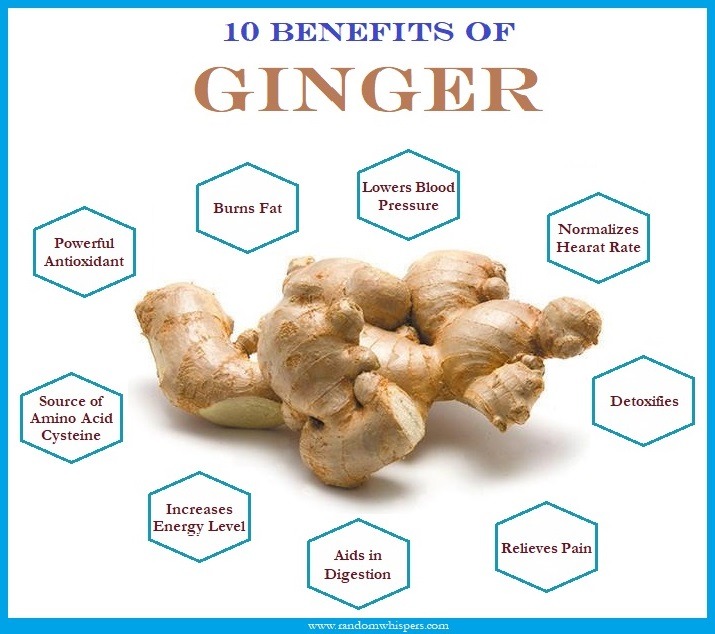
Ginger is one of the most powerful natural foods when it comes to anti-aging benefits. It contains a bioactive compound called gingerol, which has strong antioxidant properties.
In addition to its antioxidant properties, ginger is also known for its anti-inflammatory effects. Chronic inflammation is a key contributor to aging and many age-related conditions such as arthritis, heart disease, and even certain cancers. Regular consumption of ginger can help reduce inflammation in the body, alleviating joint pain, stiffness, and skin irritation—common signs of aging.
Ginger also supports skin health by improving blood circulation, which helps deliver more nutrients and oxygen to the skin. This can result in a brighter complexion and more youthful-looking skin. Moreover, ginger has antimicrobial properties that can help combat acne and other skin issues, promoting clearer and healthier skin overall.
Another major benefit of ginger is its ability to support brain health. Studies have shown that ginger can enhance cognitive function and may protect against neurodegenerative diseases such as Alzheimer’s. This is largely due to its ability to reduce inflammation in the brain and improve overall neural activity, helping to preserve memory and mental clarity with age.
Digestive health is another area where ginger excels. A healthy digestive system is closely linked to overall vitality and slower aging. Ginger aids in digestion, reduces bloating, and supports a balanced gut microbiome, all of which contribute to better nutrient absorption and less gastrointestinal discomfort.
Lastly, ginger boosts the immune system, which is essential for longevity and resilience against illness.
To incorporate ginger into your diet, you can add freshly grated ginger to teas, smoothies, or hot water with lemon. It also works well in stir-fries, soups, and stews, or as a spice in oatmeal, baked goods, and marinades. For an even more potent anti-aging boost, consider pairing ginger with turmeric and a pinch of black pepper, which enhances absorption of both spices’ beneficial compounds.
Soybeans
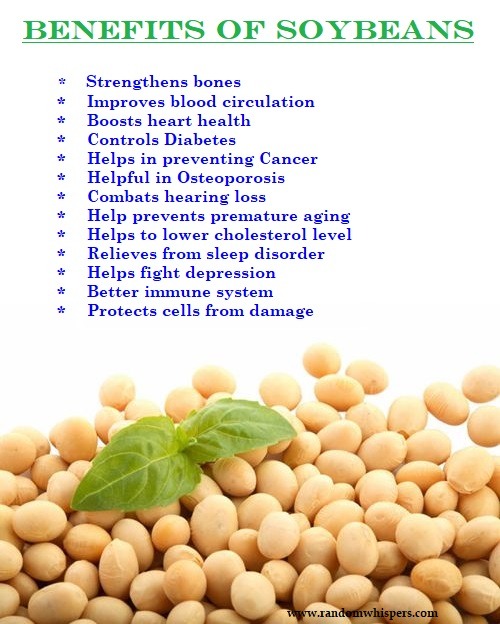
Soybeans are anti-aging foods due to their impressive nutrient composition and specific compounds that support skin health and overall vitality. A key component of soybeans is isoflavones, such as genistein and daidzein. These natural plant compounds mimic estrogen in the body, which can help maintain skin elasticity, reduce the appearance of wrinkles, and support collagen production, especially in postmenopausal women whose natural estrogen levels have declined.
Soy helps protect the skin from premature aging caused by environmental stressors such as sun exposure and pollution. The high-quality plant-based protein found in soy also plays an essential role in repairing skin tissues, promoting cell turnover, and maintaining muscle mass, all of which contribute to a youthful appearance.
Including soy in your diet can help reduce markers of inflammation, supporting long-term health and slowing the aging process. Furthermore, soy supports heart and bone health—two areas that are commonly affected as we age. Its isoflavones and other nutrients help reduce LDL (bad) cholesterol levels and promote bone density, which is vital in preventing osteoporosis and cardiovascular disease.
There are many healthy ways to include soy in your diet. Edamame, or young green soybeans, are a nutritious snack or salad topping. Tofu and tempeh are excellent meat alternatives and are highly versatile in cooking. Soy milk provides a dairy-free alternative that’s rich in protein and calcium (especially if fortified). Whereas miso, a fermented soybean paste, not only enhances flavor but also adds beneficial probiotics for gut health.
While soy is highly beneficial, it’s best consumed in moderation—about 1 to 2 servings per day is generally safe and effective for most people. Opt for non-GMO and organic soy products when possible. Favor fermented soy foods like tempeh and miso for easier digestion and enhanced nutritional benefits.
There are more anti-aging foods to combat aging but they are supposed to be supplements with other forms of foods to ensure that they will function better.



